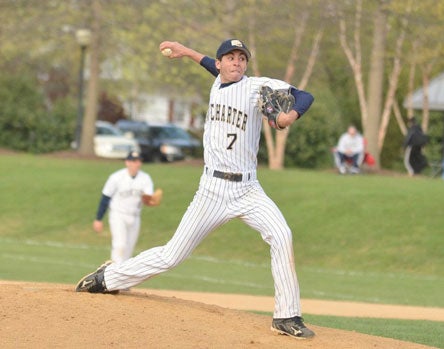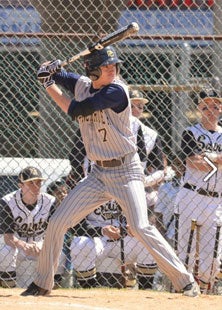The Pennsylvania standout feels college is a better choice compared with being drafted.

Kenny Koplove had undeniable high school talent and prowess. But he lacked enough in size and experience to determine that college would be better than the MLB Draft.
Photo courtesy of Steve Koplove
could remember sitting at the Olive Garden with his family, about to have dinner when the call came. His father, Steve, took the call and the next thing young Kenny knew, he was being yanked out of the restaurant without even taking a bite and off the Koplove family went — all ecstatic.
Except for Kenny. He wanted to eat.
What the family found out that early-September night in 2001 was that Kenny's older brother, Michael, had been called up to the Major Leagues and would be debuting for the Arizona Diamondbacks. It's been a dream to reach the majors ever since for Kenny, too young to understand then what was happening and who has since grown into a lean 6-foot-1, 160-pound senior right-handed pitcher-shortstop for
William Penn Charter (Philadelphia).

Kenny Koplove, William Penn Charter
Photo courtesy of Steve Koplove
This past season, Koplove was selected as Pennsylvania's Gatorade Player of the Year after going 9-2, with a 2.22 ERA and 88 strikeouts in 56.6 innings, and he was a three-time all-state selection who hit .340 with 20 RBIs, 23 runs scored, with 14 walks and 12 stolen bases.
His stats have always been impressive. Good enough to attract a bevy of Major League scouts to each of his games. But there was one gnawing thing Kenny Koplove was aware of from June 4-6, 2012: His name wouldn't be called by a Major League team in the first-year amateur player draft.
MaxPreps MLB Draft CentralTwo teams were very interested in Koplove, a Duke baseball commit. But he turned down their offers to look more toward the future and what may be a Major League career ahead.
Koplove is realistic, whereas many high school players across the country are not. They think they're ready when they're not and fizzle fast. Kenny Koplove doesn't want to be one of them.
"The truth, being honest about where things are in my development, I'm not ready now," said Koplove, a refreshing perspective in the now-is-everything world it seems modern pro sports is geared towards. "Being honest with yourself is huge. I remember going to junior nationals after my freshman year, thinking I was a lot better than I was. Then I saw where someone like Gavin Cecchini, a kid my age, was, and I knew I was nowhere near as good as that kid — and I learned a ton from that.
"I think the important thing is to keep learning. You also have to come to terms with how good you are. It's a matter of patience. I know I have to gain size, and gain weight. Then you have three years from now, I'll be ready. Now, I'm not ready. A lot of high school guys don't factor in other parts of being drafted and the step you take. I've never been away from home for an extended period before and lived on my own. I've never done my own laundry yet. For someone like me, college is only going to help."
Going to a major Atlantic Coast Conference school like Duke helps, too, even though Koplove was hit with some hard news as the draft was nearing. Blue Devils' baseball coach Sean McNally resigned on May 30, leaving commits like Koplove hanging.
"We sort of knew Kenny might not be drafted, based on the interest that he might have gotten going to Duke and he's about 160 pounds," said Steve Koplove, Kenny's father, an attorney who devotes countless hours in keeping the John Marzano League running that allows inner-city kids an opportunity to play baseball. "A special assistant to a Major League team who is a friend of mine told me it's best that Kenny go to college. The consensus among the area scouts that coached Kenny was that he could clearly play.
"There were two teams that would have taken him and we chose to be honest about it. I was told a team has to make an investment in you, that team has to feel comfortable that the kid isn't going to be out of baseball in two or three years. People recognize Kenny has talent, he just has to go to school. It isn't a bad thing and we don't view it that way."
In addition, Kenny has a great living path to follow. His older brother Michael went to Northwestern and then transferred to Delaware, where was a 29th-round pick of the Arizona Diamondbacks. He went on to have a very productive pro career, playing seven years in the majors, appearing in a World Series (and winning a bronze medal for the U.S. 2008 Olympic baseball team). Mike is now a scout for the Los Angeles Angels and works the East Coast area for the team.
"I saw what my brother did, and I know it's going to take a lot of hard work and commitment to get there," Kenny said. "The biggest thing I learned from the process is that you have to grind. I'm going to need to work harder to put on weight, to get bigger and stronger. You have to be honest with yourself. I watched those guys, a lot of guys I knew, get drafted. I wanted to be one of them. I honestly was kind of depressed not being drafted, because it's something you always dream about. We'll see what happens in three years."